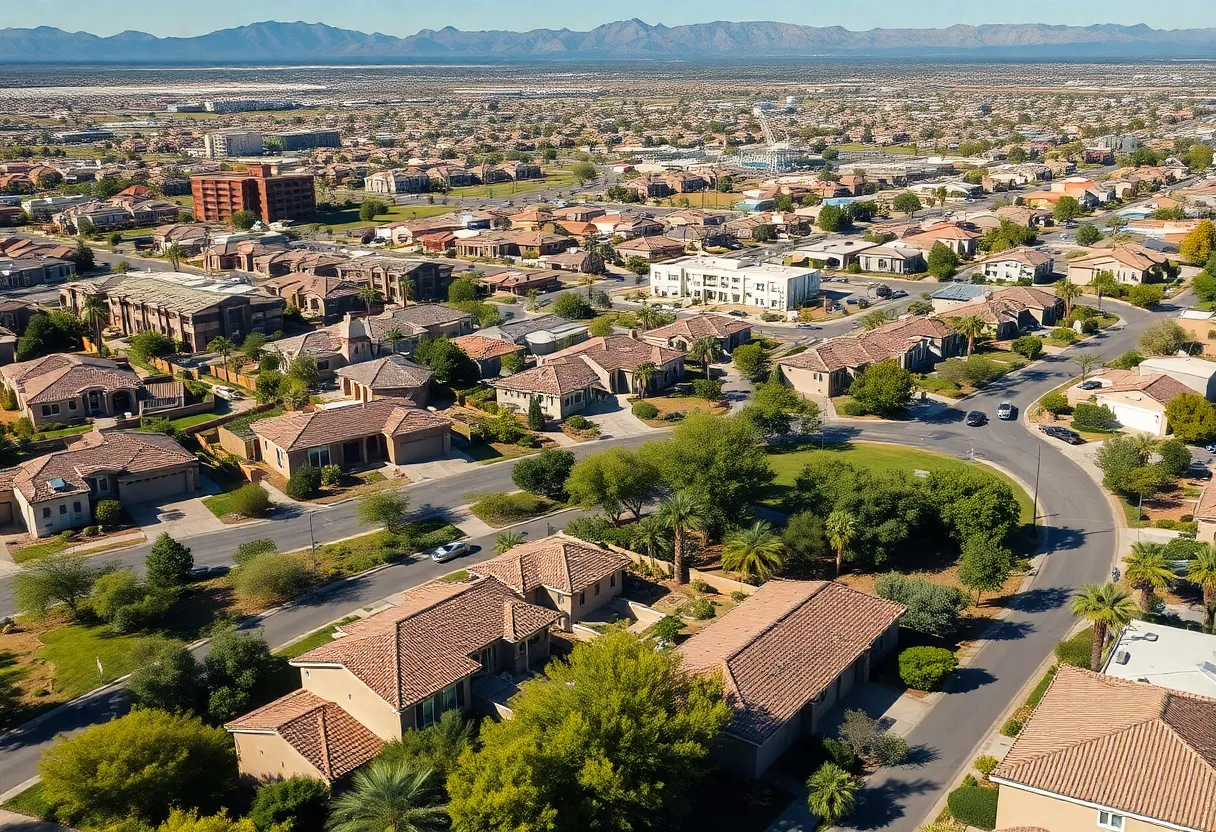News Summary
The Phoenix City Council has approved a significant increase in impact fees for new developers, primarily affecting North Phoenix and Ahwatukee. These fees, aimed at funding essential public infrastructure, could lead to higher home prices and rentals in the area. While the council expects to generate around $1.6 billion for new infrastructure over the next decade, concerns have been raised about the delays in funding for parks and affordable housing. This decision poses challenges for homebuyers navigating an already sensitive housing market.
Phoenix City Council’s Impact Fee Increase: What It Means for Home Prices
In a bold move, the Phoenix City Council approved a significant increase in impact fees for new developers. This decision is set to change the game for homebuyers and builders alike, particularly in areas shaded in red on city maps, primarily targeting regions in North Phoenix and, to a lesser extent, Ahwatukee.
Understanding Impact Fees
So, what exactly are these impact fees? Essentially, they are payments made by developers to help fund public infrastructure like water lines, sewers, streets, and community facilities like fire and police stations, libraries, and parks. The goal is to ensure that as new homes and businesses pop up, the necessary infrastructure keeps pace. However, the new fee increases could lead to home prices escalating across the board.
Concerns Over Adequate Funding
One voice in the community expressing concern is Michael Norton, the President of a local HOA in Laveen. He mentioned that parks and recreational facilities have always felt like the “stepchild” of funding priorities. With delays in park projects stretching from 15 to 40 years, there are worries that the new fees won’t resolve these longstanding issues—leaving families still waiting for the parks they deserve.
Big Bucks for Infrastructure
On the brighter side, the higher fees are expected to generate approximately $1.6 billion for new infrastructure projects over the next decade. The city’s intentions are clear: to shift the financial burden of these costs from existing residents to the newcomers moving into the area.
For example, buyers in the upcoming Upper Canyon community, which is set to build about 1,100 new homes, may find themselves digging deeper into their wallets as these new fees kick in. Initial construction on the Upper Canyon development is anticipated to start around late 2025 or early 2026.
New Facilities in Demand
As part of this increase, it’s also worth noting that the impact fees from the Upper Canyon community will contribute to a much-needed new fire station along Chandler Boulevard, costing about $12 million. Given the current housing demand, particularly influenced by developments like the new factory from the Taiwan Semiconductor Manufacturing Company (TSMC), North Phoenix is set to see a whirlwind of new housing, retail, and industrial growth.
Water Infrastructure on the Agenda
An adjustment in impact fees is not just about homes. The city also plans on constructing two new water treatment facilities to make the water system more resilient as the region grapples with ongoing severe drought conditions affecting the Colorado River. However, critics lament that the fee increases may slow down affordable housing development as state laws don’t allow the city to waive these rising fees.
A Broader Impact on Housing Prices
This newly approved fee increase is expected to have a ripple effect. Experts point out that the increased costs associated with infrastructure may lead to higher home prices and rent across the region. This isn’t the ideal news for potential homebuyers who are already facing steep prices. In fact, some developers are expressing concern about how these increased financial burdens will directly challenge affordability.
As the fees phase in, homebuyers might find it challenging to navigate this evolving landscape, particularly families seeking affordable homes. The last thing anyone wants is for these rising fees to become the straw that breaks the camel’s back in an already sensitive housing market.
In conclusion, the Phoenix City Council’s decision is packed with implications—both positive and negative. As the city aims to enhance its infrastructure, it’s crucial for all stakeholders to balance the needs of infrastructure development with the pressing demand for affordable housing. Keep an eye on developments as this story continues to unfold.
Deeper Dive: News & Info About This Topic
HERE Resources
Buckeye’s Transformation into West Valley’s Next Gem
Buckeye’s Transformation into West Valley’s Next Gem
Tempe’s Lawsuit Challenges Homeless Services Ordinance
Arizona House Approves Bill to Protect Axon Headquarters Development
New Screening Test Assists Homeless Seniors in Phoenix
Overnight Fires Displace Twelve Residents in Phoenix
Axon’s International Headquarters Set to Transform Scottsdale
Lucid Group to Acquire Nikola’s Arizona Facilities
Massive Blaze Destroys Multi-Million-Dollar Home in Paradise Valley
Lucid Motors Expands Operations with Nikola Acquisition in Arizona
Additional Resources
- The Foothills Focus: Phoenix Signs Off on Development Impact Fees
- AZCentral: Home Building Costs in Phoenix to Soar
- AZ Family: Phoenix City Council Hikes Developer Fees
- 12 News: Some Phoenix Home Building Fees are Doubling
- AZCentral: Phoenix Wants to Hike Impact Fees
- Wikipedia: Impact Fee
- Google Search: Phoenix housing market
- Google Scholar: Phoenix urban development
- Encyclopedia Britannica: Sustainable Development
- Google News: Phoenix city council impact fees

Author: STAFF HERE PHOENIX WRITER
The PHOENIX STAFF WRITER represents the experienced team at HEREPhoenix.com, your go-to source for actionable local news and information in Phoenix, Maricopa County, and beyond. Specializing in "news you can use," we cover essential topics like product reviews for personal and business needs, local business directories, politics, real estate trends, neighborhood insights, and state news affecting the area—with deep expertise drawn from years of dedicated reporting and strong community input, including local press releases and business updates. We deliver top reporting on high-value events such as the Waste Management Phoenix Open, Cactus League Spring Training, and Arizona State Fair. Our coverage extends to key organizations like the Greater Phoenix Chamber of Commerce and Visit Phoenix, plus leading businesses in technology and healthcare that power the local economy such as Intel and Banner Health. As part of the broader HERE network, including HERETucson.com, we provide comprehensive, credible insights into Arizona's dynamic landscape.





